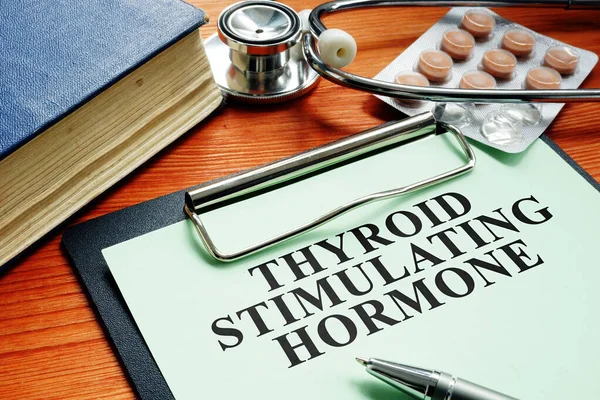What Is a Normal TSH Level by Age? Understanding your thyroid health often begins with knowing your thyroid-stimulating hormone (TSH) levels. This hormone plays a crucial role in regulating your metabolism, energy, and overall well-being. But what exactly is TSH, why is it important, and how do normal levels vary by age? Doctors Maria Teresa Anton, MD, and Raj Dasgupta, MD, provide expert insights to help you interpret your TSH readings and maintain thyroid health throughout life.

What is TSH, and Why Is It Important?
TSH is a hormone produced by the pituitary gland in the brain that acts as a master regulator for your thyroid gland. According to Maria Teresa Anton, MD, an endocrinologist at the Pritikin Longevity Center, TSH signals the thyroid to produce thyroid hormones like T3 and T4, which control metabolism, energy levels, and many bodily functions. The pituitary adjusts TSH production based on the amount of thyroid hormone circulating in your blood, making TSH a reliable indicator of thyroid function over time.
Dr. Anton explains that measuring TSH offers a more integrated view of thyroid status compared to measuring thyroid hormones alone, which can fluctuate throughout the day. For example, if thyroid hormone levels are low, TSH rises to stimulate more production; if thyroid hormones are high, TSH decreases to reduce stimulation. This feedback loop helps maintain hormonal balance essential for health.
What Is a Normal TSH by Age? Doctors Explain the Numbers
Raj Dasgupta, MD, chief medical advisor for Sleepopolis, highlights that there isn’t a universally standard TSH range by age, but typical reference ranges do vary somewhat across different life stages. Generally, normal TSH levels fall between approximately 0.4 and 4.5 milliunits per liter (mU/L) in adults, but these can shift with age, sex, and physiological changes.
For instance, younger adults (18–30 years) typically have a normal TSH range of about 0.5 to 4.1 mU/L, while older adults (71–90 years) may have higher upper limits, around 5.2 mU/L or slightly above. This increase in upper normal TSH with age is thought to reflect natural changes in thyroid function over time and does not necessarily indicate disease.
Here is a simplified overview of normal TSH ranges by age:
| Age Range | Normal TSH Range (mU/L) |
|---|---|
| 18–30 years | 0.5 – 4.1 |
| 31–50 years | 0.5 – 4.1 |
| 51–70 years | 0.5 – 4.5 |
| 71–90 years | 0.4 – 5.2 |
It’s important to note that while these ranges provide guidance, individual factors and symptoms must be considered. Dr. Dasgupta emphasizes that TSH levels should be interpreted alongside clinical context rather than rigidly by age alone.
Health Conditions That May Impact TSH Levels
TSH levels can be influenced by various health conditions and hormonal transitions. Dr. Anton points out that hormonal changes such as menopause can make thyroid symptoms — including fatigue, mood swings, and weight gain — more noticeable, even if TSH remains within the normal range. This means symptoms might arise without a clear abnormality in TSH, complicating diagnosis and management.

Other factors that can affect TSH include:
- Autoimmune thyroid diseases like Hashimoto’s thyroiditis or Graves’ disease
- Pregnancy and postpartum hormonal shifts
- Medications such as steroids or iodine-containing contrast agents
- Non-thyroidal illnesses like infections or stress
For example, during pregnancy, TSH levels typically decrease in the first trimester due to increased thyroid hormone production, requiring trimester-specific reference ranges for accurate interpretation.
How to Safely Monitor TSH at Home
Monitoring TSH at home is not as simple as using a home glucose meter, but there are safe ways to keep track of your thyroid health:
- Regular blood tests: The most reliable method is periodic blood testing ordered by your healthcare provider.
- Symptom tracking: Keep a journal of symptoms such as fatigue, weight changes, or mood shifts, which can prompt timely testing.
- Avoid self-adjusting medication: Never change thyroid medication doses without consulting your doctor, as improper dosing can cause serious health issues.
- Use telemedicine: Many providers offer virtual visits and home blood draw services for convenience.
By staying engaged with your healthcare team and noting any changes in how you feel, you can ensure timely assessment of your thyroid function.
Easy Ways to Keep TSH Levels in a Healthy Range
Maintaining healthy TSH levels involves supporting overall thyroid function through lifestyle and medical care:
- Balanced diet: Ensure adequate iodine intake through iodized salt or foods like seafood, but avoid excessive iodine, which can disrupt thyroid function.
- Manage stress: Chronic stress can affect hormone balance; practices like mindfulness and regular exercise help reduce its impact.
- Regular check-ups: Especially important for women during hormonal transitions like pregnancy or menopause.
- Medication adherence: For those diagnosed with thyroid disorders, consistent use of prescribed thyroid hormone replacement or antithyroid medications is crucial.
- Avoid environmental toxins: Some chemicals can interfere with thyroid function; minimizing exposure supports thyroid health.
For example, a woman entering menopause who experiences fatigue and weight gain should have her thyroid function evaluated, even if TSH is normal, to rule out subtle thyroid dysfunction or other hormonal imbalances.
In summary, TSH is a key hormone that reflects your thyroid’s health and function. Normal TSH ranges vary somewhat by age but generally fall between 0.4 and 4.5 mU/L in adults, with higher upper limits in older adults. Hormonal changes, health conditions, and lifestyle factors can influence TSH levels and thyroid symptoms. Regular monitoring through blood tests and awareness of symptoms, combined with healthy habits, can help maintain optimal thyroid function and overall well-being.
Also Read | What Is Core Sleep? Why You Need More and How to Sleep Deeper Tonight










